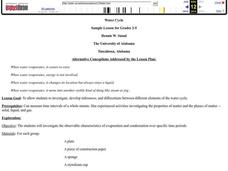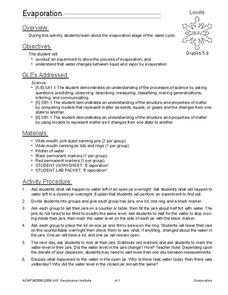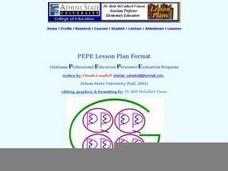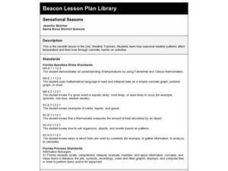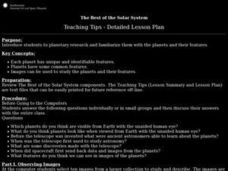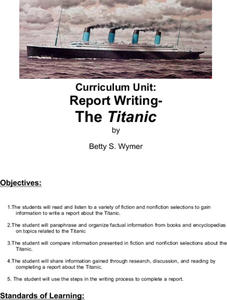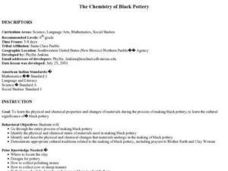Curated OER
Permafrost
Students use a thermometer to analyze soil temperature data to determine which soil sample is normal, and which one is permafrost. In this permafrost lesson plan, students participate in a hands on activity where they identify the active...
Curated OER
Matter: Build a Word
Fourth graders examine matter and the periodic table of elements. In this matter lesson, 4th graders discuss atoms and their composition. Students explore the periodic table of elements and use it to spell words out of the elements.
Pennsylvania Department of Education
The Weight of Things
Students explore weight. In this math instructional activity, students predict which item weighs more and discuss how they arrived at their decision. Students weigh several items to determine which weighs more.
Curated OER
How Do You Dew?
Students examine how the processes of condensation and evaporation occur. They describe the relationship between heat energy, evaporation and condensation of water on Earth. They give examples of the processes of evaporation and...
Curated OER
Matter in Solution
In this solutions worksheet, students review types of solutions, concentration and saturation of solutions, and suspensions and colloids. This worksheet has 10 fill in the blank, 7 multiple choice, and 6 short answer questions.
Curated OER
Phases
In this phases worksheet, learners rank the chemical compounds by decreasing vapor pressure. Students use a phase diagram to determine if water undergoes any phase transitions during the four steps described. This worksheet has 8...
Curated OER
Water Is Cool!
Middle schoolers study water as a non-renewable resource. In this water instructional activity, students examine sources of water, uses of water, and explain why it is important to take care of water sources for the common good. They...
Curated OER
Water Cycle Adventure
Students take an imaginary journey through the water cycle. In this water cycle lesson plan, students identify the various parts of the water cycle, listen while their teacher leads them on an imaginary journey through the water cycle,...
Curated OER
Water Cycle
Students investigate, develop inferences, and differentiate between different elements of the water cycle. They investigate the observable characteristics of evaporation and condensation over specific time periods
Curated OER
Evaporation
Students study the evaporation stage of the water cycle. For this water cycle lesson, students participate in an experiment to study the process of evaporation that uses jars and water. Students complete an observation worksheet for the...
Curated OER
Three Clouds Activity
Learners explore how clouds are produced through three different age-appropriate hands-on experiments.
Curated OER
Science: What Is the Carbon Cycle?
Students examine the carbon cycle while identifying its sources, sinks, and release agents. Using magazines and newspapers, groups of students design collages illustrating the carbon cycle. Finally, they write responses to several...
Curated OER
IPC Textbook Guided Reading-Chapter 27-Heat
In this heat instructional activity, learners answer 21 short answer questions about heat transfer through conduction and convection, thermal conduction and conductors.
Curated OER
Vibrant Volcanoes
Students explore volcanoes. In this science lesson plan, students discuss the characteristics of volcanoes and view a video segment about a volcano. Students examine plate tectonics.
Curated OER
What Really Matters When it Comes to Sound?
Students conduct experiments to learn about sound wave vibrations in objects and pitch. Students test how varying the volume of water in a vessel changes frequency and pitch.
Curated OER
The Best of the Solar System (Grades 4-7)
Students explore planetary research and become familiar with the planets and their characteristics. They compare and contrasts planets and moons.
Curated OER
Capacity and Volume
Second graders estimate capacities, compare pints and quarts, and identify pints and quarts.
Curated OER
Sensational Seasons
Second graders explore how seasonal weather patterns affect temperature and their lives.
Curated OER
Octopus Legs
Students have oceans of fun transforming a wienie into an octopus they can eat! After counting, cutting halves and fourths, observing steam and the effects of heat, they mix colors as they create a yummy dipping sauce from mustard and...
Curated OER
The Best of the Solar System (Grades 6-8)
Learners are introduced to planetary research and become familiar with the planets and their features. They view images of the planets, and fill in an information chart which is imbedded in this plan.
Curated OER
Conductors and Insulators
Fifth graders investigate conductors and insulators by testing their hypotheses. They use copper wire and batteries to light a bulb. They use a penny and a plastic spoon to determine which is an insulator and which is a conductor.
Curated OER
The Titanic
Middle schoolers use various sources to compare and contrast information about the Titanic. In groups, they create a list of questions and use the internet to find the answers. They write a report with the new information and use their...
Curated OER
Matter
Third graders are introduced to the topic of matter. As a class, they brainstorm what they already know about matter and its properties. After completing a worksheet, they participate in an experiment in which they observe matter in...
Curated OER
The Chemistry of Black Pottery
Sixth graders create pottery out of black clay using traditional methods. They demonstrate appropriate Native American cultural traditions related to the making of black pottery, including prayers to Mother Earth and Clay Woman.
Other popular searches
- Liquids and Solids
- Solids Liquids and Gases
- Solids Liquids Gases
- Solids, Liquids, Gases
- Solids, Liquids and Gases
- Solids Liquids Gas
- Pictures Solids Liquids Gas
- Solids, Liquids, and Gases
- Solids Liquids and Gas
- Solids Liquids Gases Quiz
- Matter Solids Liquids
- Liquids Solids










